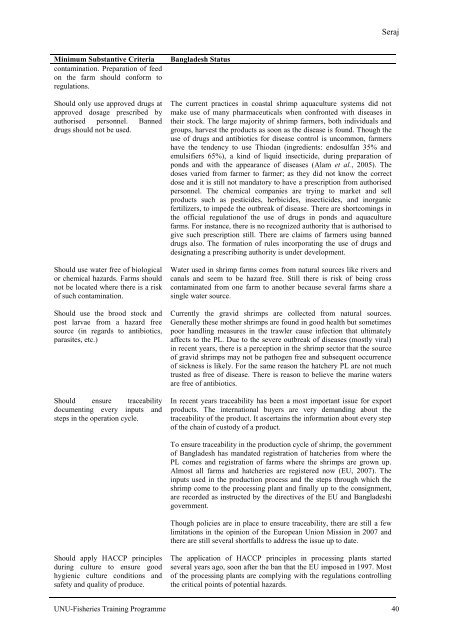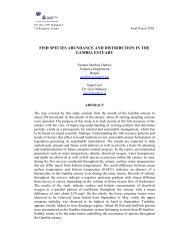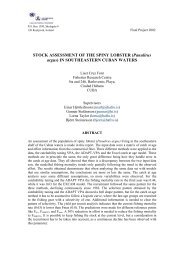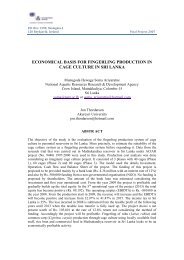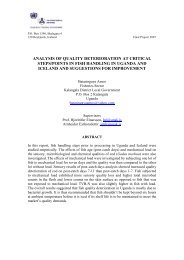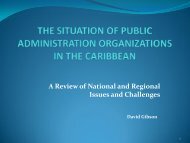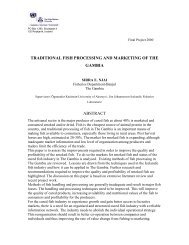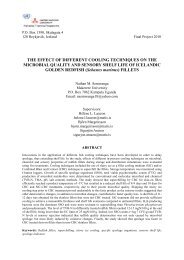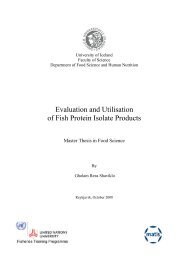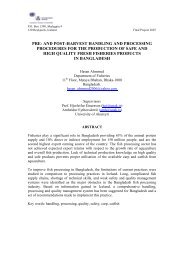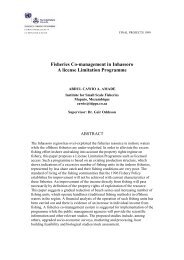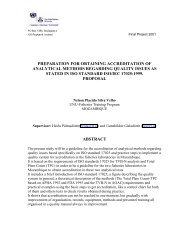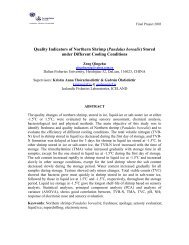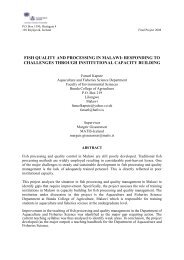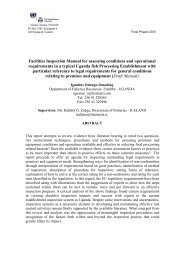a compliance study of Bangladesh shrimp aquaculture - The United ...
a compliance study of Bangladesh shrimp aquaculture - The United ...
a compliance study of Bangladesh shrimp aquaculture - The United ...
You also want an ePaper? Increase the reach of your titles
YUMPU automatically turns print PDFs into web optimized ePapers that Google loves.
SerajMinimum Substantive Criteriacontamination. Preparation <strong>of</strong> feedon the farm should conform toregulations.Should only use approved drugs atapproved dosage prescribed byauthorised personnel. Banneddrugs should not be used.Should use water free <strong>of</strong> biologicalor chemical hazards. Farms shouldnot be located where there is a risk<strong>of</strong> such contamination.Should use the brood stock andpost larvae from a hazard freesource (in regards to antibiotics,parasites, etc.)Should ensure traceabilitydocumenting every inputs andsteps in the operation cycle.<strong>Bangladesh</strong> Status<strong>The</strong> current practices in coastal <strong>shrimp</strong> <strong>aquaculture</strong> systems did notmake use <strong>of</strong> many pharmaceuticals when confronted with diseases intheir stock. <strong>The</strong> large majority <strong>of</strong> <strong>shrimp</strong> farmers, both individuals andgroups, harvest the products as soon as the disease is found. Though theuse <strong>of</strong> drugs and antibiotics for disease control is uncommon, farmershave the tendency to use Thiodan (ingredients: endosulfan 35% andemulsifiers 65%), a kind <strong>of</strong> liquid insecticide, during preparation <strong>of</strong>ponds and with the appearance <strong>of</strong> diseases (Alam et al., 2005). <strong>The</strong>doses varied from farmer to farmer; as they did not know the correctdose and it is still not mandatory to have a prescription from authorisedpersonnel. <strong>The</strong> chemical companies are trying to market and sellproducts such as pesticides, herbicides, insecticides, and inorganicfertilizers, to impede the outbreak <strong>of</strong> disease. <strong>The</strong>re are shortcomings inthe <strong>of</strong>ficial regulation<strong>of</strong> the use <strong>of</strong> drugs in ponds and <strong>aquaculture</strong>farms. For instance, there is no recognized authority that is authorised togive such prescription still. <strong>The</strong>re are claims <strong>of</strong> farmers using banneddrugs also. <strong>The</strong> formation <strong>of</strong> rules incorporating the use <strong>of</strong> drugs anddesignating a prescribing authority is under development.Water used in <strong>shrimp</strong> farms comes from natural sources like rivers andcanals and seem to be hazard free. Still there is risk <strong>of</strong> being crosscontaminated from one farm to another because several farms share asingle water source.Currently the gravid <strong>shrimp</strong>s are collected from natural sources.Generally these mother <strong>shrimp</strong>s are found in good health but sometimespoor handling measures in the trawler cause infection that ultimatelyaffects to the PL. Due to the severe outbreak <strong>of</strong> diseases (mostly viral)in recent years, there is a perception in the <strong>shrimp</strong> sector that the source<strong>of</strong> gravid <strong>shrimp</strong>s may not be pathogen free and subsequent occurrence<strong>of</strong> sickness is likely. For the same reason the hatchery PL are not muchtrusted as free <strong>of</strong> disease. <strong>The</strong>re is reason to believe the marine watersare free <strong>of</strong> antibiotics.In recent years traceability has been a most important issue for exportproducts. <strong>The</strong> international buyers are very demanding about thetraceability <strong>of</strong> the product. It ascertains the information about every step<strong>of</strong> the chain <strong>of</strong> custody <strong>of</strong> a product.To ensure traceability in the production cycle <strong>of</strong> <strong>shrimp</strong>, the government<strong>of</strong> <strong>Bangladesh</strong> has mandated registration <strong>of</strong> hatcheries from where thePL comes and registration <strong>of</strong> farms where the <strong>shrimp</strong>s are grown up.Almost all farms and hatcheries are registered now (EU, 2007). <strong>The</strong>inputs used in the production process and the steps through which the<strong>shrimp</strong> come to the processing plant and finally up to the consignment,are recorded as instructed by the directives <strong>of</strong> the EU and <strong>Bangladesh</strong>igovernment.Though policies are in place to ensure traceability, there are still a fewlimitations in the opinion <strong>of</strong> the European Union Mission in 2007 andthere are still several shortfalls to address the issue up to date.Should apply HACCP principlesduring culture to ensure goodhygienic culture conditions andsafety and quality <strong>of</strong> produce.<strong>The</strong> application <strong>of</strong> HACCP principles in processing plants startedseveral years ago, soon after the ban that the EU imposed in 1997. Most<strong>of</strong> the processing plants are complying with the regulations controllingthe critical points <strong>of</strong> potential hazards.UNU-Fisheries Training Programme 40


